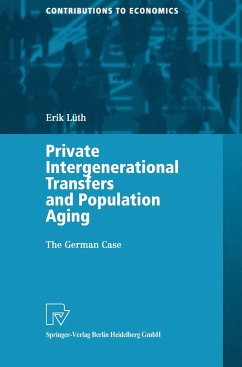
Social Security, Demographics, and Risk
Versandkostenfrei!
Versandfertig in 1-2 Wochen
77,99 €
inkl. MwSt.
Weitere Ausgaben:

PAYBACK Punkte
39 °P sammeln!
This volume addresses the most important issues of the ongoing discussion on designing social security. It provides fundamental results for pay-as-you-go social security, covers the issues of social security during demographic transition and examines the inclusion of risk aspects into the analysis of social security. An empirical case study of Germany yields the surprising result that de facto the German public pension scheme already comprises an implicit demographic factor. This book allows a subtle understanding of how interacting risks are treated within different pension systems and thereby provides a basis for the development of innovative ways of risk sharing.
This study has been written during my time at the Institute of Public Finance at the Albert Ludwigs University of Freiburg, Germany. I am indebted to a number of people who have made this work possible. First and foremost, I thank my teacher Prof. Dr. Bernd Raffelhuschen with whom I had the pleasure of working for many exciting years. The German term Doktorvater alludes to the fatherly role of a thesis supervisor, and he has truely lived up to this role. Also, I am grateful to Prof. Dr. Dr. h. c. Hans-Hermann Francke for his co-correction and the valuable comments he has given me. In addition, I wish to thank my family. Especially, my wife, Daniela, has not only supported me with her love and affection but has also kept an eye on my discipline when the going got tough. The greatest sacri?ce in the course of working on this thesis, have been the miles and many hours away from her. Unfortunately, the yearsofmydoctoralstudieswereovershadowedbythedeathofmyfather. Tohimand mymother,Eva-MariaBorgmann,Iamimmenselygratefulfortheirloveandsupport throughout my life. Daniel Besendorfer and Erik Luth have been close companions and friends at the Institute of Public Finance from my ?rst days in Freiburg, and I have gained from their friendship enormously. This work has largely pro?ted from comments and suggestions of many colleagues who have also been great fun to work with. Among them, I especially thank Holger Bonin, Oliver Ehrentraut, Matthias Heidler, Stefan Fetzer, Pascal Krimmer, and Stefan Moog.














